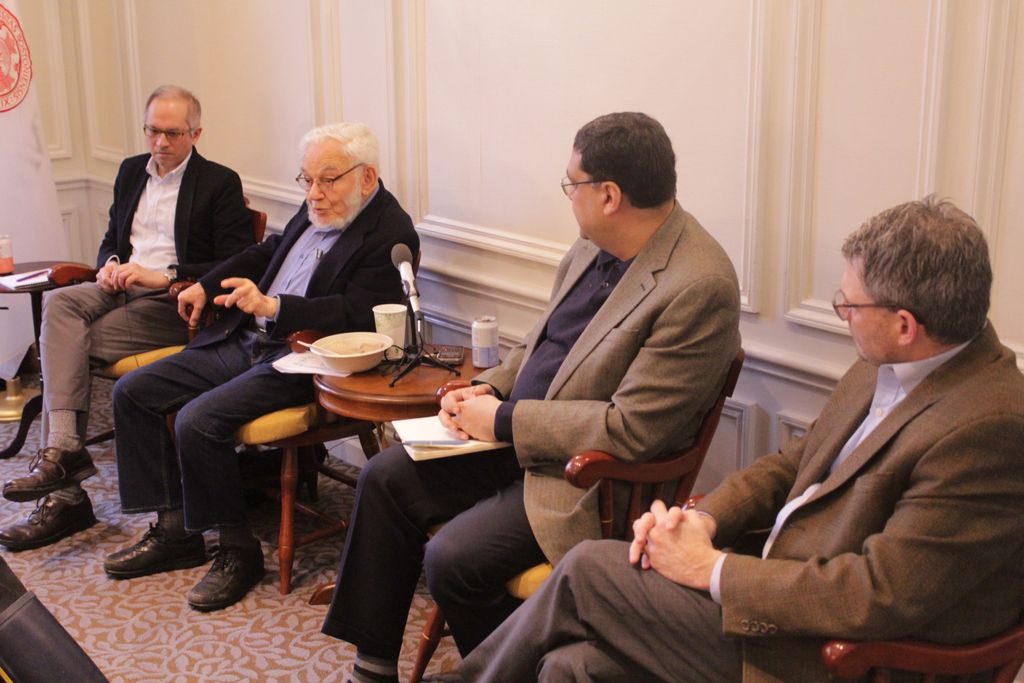BtH: Politics of Development Research in the McCarthy Era
The Beyond the Headlines @BUPardeeSchool, or BtH, series at the Frederick S. Pardee School of Global Studies at Boston University, continued on January 22, 2018 with a panel discussion on the impact of the McCarthy era on the politics of development research. The conversation was co-hosted by the Global Development Policy Center, an affiliated center of the Pardee School.
The panel included Gustav F. Papanek, Emeritus Professor of Economics at Boston University; Ehsan Masood, Knight Fellow in Science Journalism at the Massachusetts Institute of Technology; and Kevin Gallagher, Director of the Global Development Policy Center and Professor of Global Development Policy at the Pardee School. The conversation was moderated by Pardee School Dean Adil Najam.
Papanek, who in his 45-year career on the economics of development has directed ten major policy advisory and research teams focusing on aspects of development strategy, described the hesitancy during the McCarthy era to support research related to communist governments in the developing world.
“There was unwillingness to do research on any country that had a communist government, and there was a great reluctance on the part of the aid program to support any research that could be criticized until McCarthy was finally destroyed in the Army-McCarthy hearings,” Papanek said. “It affected some careers irrevocably, it affected the government agencies to some degree, it affected more general knowledge — particularly on China, but on other communist countries as well — and it affected knowledge on development to a small extent.”
Comparing the politics of development research in the McCarthy era to the climate development researchers currently face, Masood said scale is the most notable difference.
“It wasn’t just the Un-American Activities Committee in Washington that was going after people — it was every state legislator, it was school boards, it was college administrations, it was university administrations,” Masood said. “Nobody in the United States public sector wanted the embarrassment of not knowing who might be a suspected communist, or a suspected left-wing sympathizer, or just a democratic socialist. There were a lot of internal purges that were happening — this kind of great foment of finding out and ratting on people.”
Gallagher said a fundamental problem with the politics of development in the United States is the failure to see international development as an integral part of being an American and global citizen.
“The reason why the World Bank, the IMF and the international trading system were all set up was to try to prevent another depression, to prevent the rise of somebody like Hitler, and even prevent the rise of communism,” Gallagher said. “The Marshall Plan and the World Bank were there to rebuild war torn Europe so communists wouldn’t infiltrate the unions in Europe, not to alleviate poverty which didn’t become a mission of these things until the 1970s. One of the problems Republicans and Democrats both have in the United States political system is that development has sort of lost this larger context that it once had.”
Beyond the Headlines is a regular series at the Frederick S. Pardee School of Global Studies which seeks to cultivate informed conversations among experts and practitioners on issues that are currently in the news headlines, but to do so with a focus on intellectual analysis and on longer-range trends. Recent Beyond the Headlines discussions have focused on topics including Rwanda’s Social Institutions, China’s Communist Party Congress, the future of U.S. global climate policy, and the economic challenges facing Puerto Rico.
